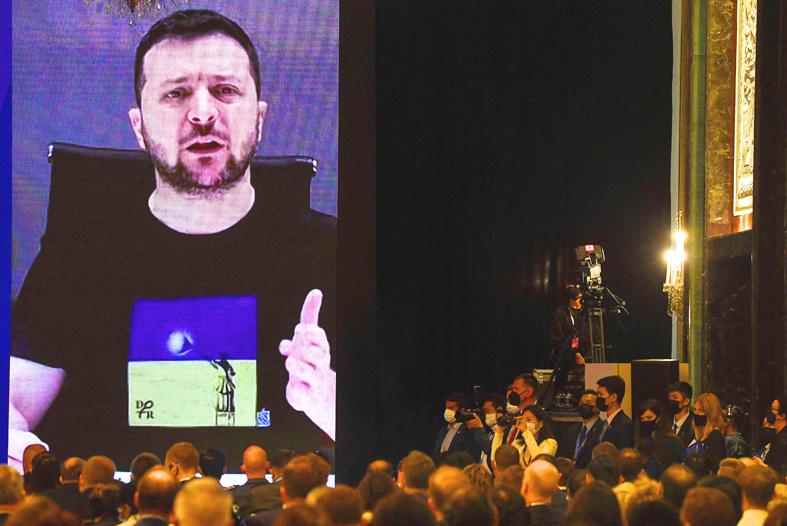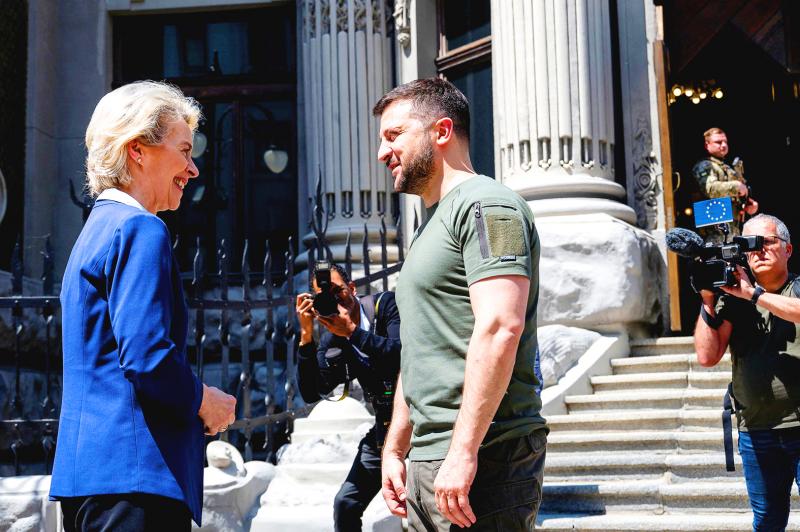Diplomatic solutions can prevent conflicts, Ukrainian President Volodymyr Zelenskiy said yesterday, when asked to give Taiwan advice.
Zelenskiy made the remark in response to media queries following a special address he gave via video link to the Shangri-La Dialogue security summit in Singapore from Friday to yesterday.
“How do you recommend that Taiwan stand strong as China seeks to impose its control over a free people, by force if necessary?” a reporter asked the Ukrainian president.

Photo: AFP
Pre-emptive measures should be taken against wars, which “no one benefits from,” except for a few political leaders with ever-growing ambitions, Zelenskiy said.
Action should be taken before a war has started and caused “hundreds of thousands of casualties, and even millions of casualties like we have in Ukraine,” he said. “If there is a way out diplomatically, we need to use the diplomatic way.”
Zelenskiy did not directly mention Taiwan or China in his response, but said that Russia’s war against Ukraine is a lesson for the whole world.

Photo: Reuters
“We need a diplomatic resolution to support countries that are in need of help” and not leave them behind to be assaulted by a more powerful country, he said.
Ukraine respects international law and has “no intention or plan” to invade Russian territory, he said, calling on the world to put the Russian leadership in its place — that is, in its own country.
Zelenskiy thanked everyone who backs Ukraine, saying that the support and attention are not only to ensure the safety of Ukraine, but also the safety of the whole world.

CHAOS: Iranians took to the streets playing celebratory music after reports of Khamenei’s death on Saturday, while mourners also gathered in Tehran yesterday Iranian Supreme Leader Ayatollah Ali Khamenei was killed in a major attack on Iran launched by Israel and the US, throwing the future of the Islamic republic into doubt and raising the risk of regional instability. Iranian state television and the state-run IRNA news agency announced the 86-year-old’s death early yesterday. US President Donald Trump said it gave Iranians their “greatest chance” to “take back” their country. The announcements came after a joint US and Israeli aerial bombardment that targeted Iranian military and governmental sites. Trump said the “heavy and pinpoint bombing” would continue through the week or as long

TRUST: The KMT said it respected the US’ timing and considerations, and hoped it would continue to honor its commitments to helping Taiwan bolster its defenses and deterrence US President Donald Trump is delaying a multibillion-dollar arms sale to Taiwan to ensure his visit to Beijing is successful, a New York Times report said. The weapons sales package has stalled in the US Department of State, the report said, citing US officials it did not identify. The White House has told agencies not to push forward ahead of Trump’s meeting with Chinese President Xi Jinping (習近平), it said. The two last month held a phone call to discuss trade and geopolitical flashpoints ahead of the summit. Xi raised the Taiwan issue and urged the US to handle arms sales to

State-run CPC Corp, Taiwan (CPC, 台灣中油) yesterday said that it had confirmed on Saturday night with its liquefied natural gas (LNG) and crude oil suppliers that shipments are proceeding as scheduled and that domestic supplies remain unaffected. The CPC yesterday announced the gasoline and diesel prices will rise by NT$0.2 and NT$0.4 per liter, respectively, starting Monday, citing Middle East tensions and blizzards in the eastern United States. CPC also iterated it has been reducing the proportion of crude oil imports from the Middle East and diversifying its supply sources in the past few years in response to geopolitical risks, expanding

Pro-democracy media tycoon Jimmy Lai’s (黎智英) fraud conviction and prison sentence were yesterday overturned by a Hong Kong court, in a surprise legal decision that comes soon after Lai was jailed for 20 years on a separate national security charge. Judges Jeremy Poon (潘兆初), Anthea Pang (彭寶琴) and Derek Pang (彭偉昌) said in the judgement that they allowed the appeal from Lai, and another defendant in the case, to proceed, as a lower court judge had “erred.” “The Court of Appeal gave them leave to appeal against their conviction, allowed their appeals, quashed the convictions and set aside the sentences,” the judges